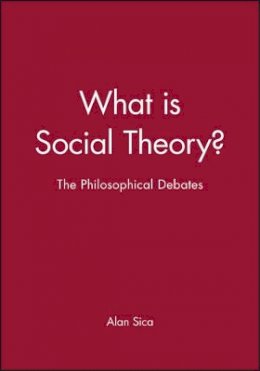
Stock image for illustration purposes only - book cover, edition or condition may vary.
What is Social Theory?: The Philosophical Debates
Sica
€ 178.44
FREE Delivery in Ireland
Description for What is Social Theory?: The Philosophical Debates
Hardback. In this collection of original essays, the intersection of philosophy and social theory is examined from a variety of viewpoints, some from the interpretative side of the discipline, and others from within the camp of formal and mathematical modelling. Editor(s): Sica, Professor Alan. Num Pages: 296 pages, 0. BIC Classification: HPC; JH. Category: (P) Professional & Vocational; (UP) Postgraduate, Research & Scholarly; (UU) Undergraduate. Dimension: 236 x 161 x 27. Weight in Grams: 546.
An innovative and wide ranging collection of original essays by today's leading social theorists aiming to clarify the current uses being made of philosophical ideas in the creation of social thought.
An innovative and wide ranging collection of original essays by today's leading social theorists aiming to clarify the current uses being made of philosophical ideas in the creation of social thought.
Product Details
Format
Hardback
Publication date
1998
Publisher
John Wiley and Sons Ltd United Kingdom
Number of pages
296
Condition
New
Number of Pages
298
Place of Publication
Hoboken, United Kingdom
ISBN
9780631209546
SKU
V9780631209546
Shipping Time
Usually ships in 7 to 11 working days
Ref
99-50
About Sica
Alan Sica is Professor of Sociology and Director of the Graduate Program in Social Thought at Pennsylvania State University. For five years the editor of Sociological Theory, his other books include Weber, Irrationality, and Social Order (1988) and Ideologies and Corruption of Thought (1997) and forthcoming with Blackwell Max Weber and the New Century.
Reviews for What is Social Theory?: The Philosophical Debates
"To invite authors of two broadly contrasting sociological camps to engage in the discussion helps to highlight a wide variety of issues in such a clear manner as to be of great value to students, not to mention a wider readership. For it not only enables the reader to understand the broadly accepted dual demarcation of interpretative and positive, but also to illuminate the more subtle differences that exist within each camp." Michael Keaney, University of Glasgow "There is no more thorough an editor in sociology than Alan Sica for the simple reason that there are so few who are as broadly literate as he and who, at the same time, know and understand good books and good writing. The list of authors include the most astute sociologists who happen to know philosophy." Charles Lemert, Wesleyan University "This volume would make useful reading for those interested in the philosophical underpinnings of social theory and where its continued inter-connection may take it in the future as well as, arguably, essential reading for those within the discipline who look more towards the natural sciences than the humanities for their influence." John Walliss, BSA
